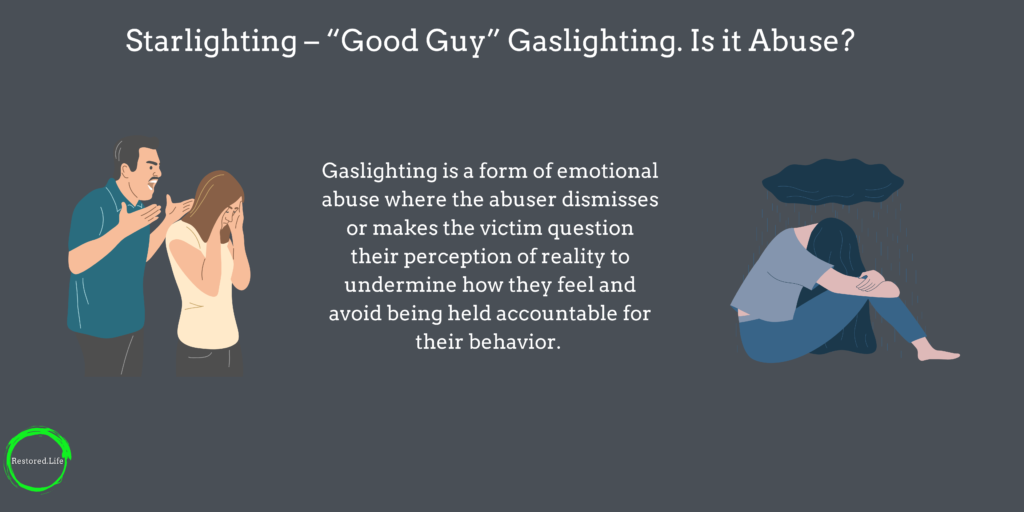Starlighting is the “good guy” version of gaslighting. So for context, a brief explanation of gaslighting is needed.
What is gaslighting?
Gaslighting is a form of emotional abuse where the abuser dismisses or makes the victim question their perception of reality to undermine how they feel and avoid being held accountable for their behavior.
What is an example of gaslighting in a relationship?
Examples of gaslighting may include:
“You really think I would cheat on you? You’re just insecure.”
“You’re too sensitive.”
“You have a terrible memory.”
“I’m sorry you think that I hurt you.”
“Why are you so paranoid? You know I would never do that.”
What is Starlighting?
Starlighting is the “good guy” version of gaslighting. It can happen as a form of spiritual abuse, using Bible verses or an appeal to God to manipulate the abused person into doing what the abuser wants. It can also happen in recovery situations when someone lists all the recovery activities they are doing, but the attitude behind those activities is solely consequence avoidance.
Consequence avoidance is a common way for recovery to start. But it shouldn’t last long. When consequence avoidance goes on too long, it is safe to say someone is “doing recovery but is not in recovery.”
Someone who is starlighting wants to appeal to their faith, their higher power, or their good character in other areas in life to “cancel out” their harmful behavior. It is a tool to avoid responsibility for the hurt they are causing.

What are some examples of starlighting?
“I’m going to group (or counseling or church); why are you still mad at me?”
“I’m reading recovery and marriage books for an hour every night; when will you be satisfied that I am taking this seriously?”
“The Bible says to keep no record of wrongs, so you’re just being bitter.”
“She was hurting and needed someone to help her and support her, I didn’t sleep with her, why are you so mad?”
Can starlighting or gaslighting be unintentional?
Gaslighting can be unintentional, especially if neither partner tries to be controlling. Most people have used gaslighting behaviors as a defense mechanism at some point in their life. This doesn’t diminish the significance or potential harm of this behavior.
However, saying that it happened by accident can also be gaslighting. How’s that for a mental Gordian Knot? The key to distinguishing abusive gaslighting from non-abusive gaslighting is context. It is abusive when gaslighting happens in the company of other controlling or abusive behaviors. When gaslighting is the only potentially abusive behavior in a relationship, it is more likely to be defensiveness (which is still harmful, just not as bad).
With starlighting, the same principle applies. If there are no other controlling or abusive behaviors, it is defensiveness, not abusive starlighting.
What if the claim in the starlighting is true?
Let’s take the example of “I’m going to group every week; why are you still mad at me?” The person may be going to group. But the fact of going to group, even going and being genuinely engaged in the group, does not erase the harm done by previous choices that created the reasons for the person to be going to group in the first place.
The betraying person needs to take responsibility for the harm done by their previous choices and acknowledge the hurt that still exists. If the hurt person is actively working on his or her healing, this hurt should get smaller over time. It may never go away, but it doesn’t need to keep functioning as a wedge between the couple.
After the present hurt from past choices has been owned and validated, here are a few check-questions to help both people understand the authenticity of the group engagement. (While these questions are for our specific example, they can be adapted to any other starlighting claim).
When you go to group, what do you share, or do you only listen?
When you go to group, how honest are you with the group?
What friendships have you made in the group?
How are those friendships supporting your recovery?
What are you learning from group?
What other changes have you made in your life because of what you have learned from group in the past?
How is what you are learning protecting us from those sorts of choices ever being made again?
If the betraying person cannot or will not provide substantive answers to these questions or similar questions, then there is cause for concern.
